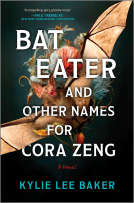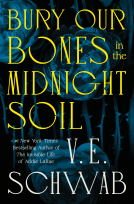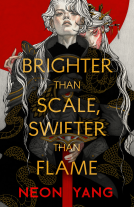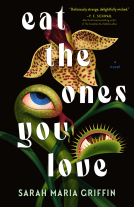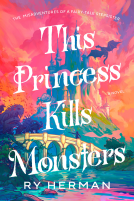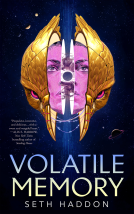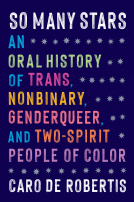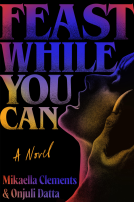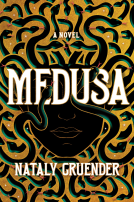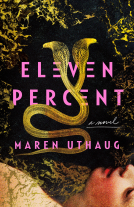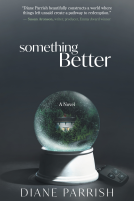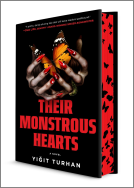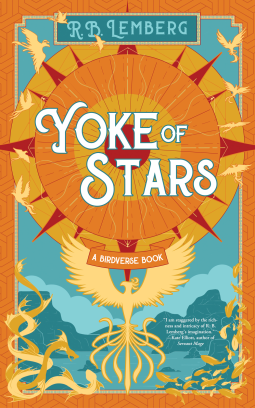
Yoke of Stars: A Birdverse Book
by R. B. Lemberg
This title was previously available on NetGalley and is now archived.
Send NetGalley books directly to your Kindle or Kindle app
1
To read on a Kindle or Kindle app, please add kindle@netgalley.com as an approved email address to receive files in your Amazon account. Click here for step-by-step instructions.
2
Also find your Kindle email address within your Amazon account, and enter it here.
Pub Date Jul 16 2024 | Archive Date Jul 29 2024
Talking about this book? Use #YokeofStarsABirdverseBook #NetGalley. More hashtag tips!
Description
An apprentice assassin and an inquisitive linguist trade interwoven tales in order to enact revenge. Ukrainian author R. B. Lemberg (The Four Profound Weaves) returns to their legendary Birdverse in an ode to the transformative power of storytelling.
“Haunting, nuanced, and hopeful, Yoke of Stars is essential reading.”
—Izzy Wasserstein, author of These Fragile Graces, This Fugitive Heart
In the School of Assassins, Stone Orphan waits for a first assignment. After their first kill, they will graduate and attain the coveted cloth of bone. But instead of a commission, Stone Orphan gets an inquisitive linguist, Ulín. Ulín has heard the Orphan Star’s song of despair, mirroring her own, and drawing her to the School of Assassins. But Ulín is far more interested in learning Stone Orphan’s language than deciding whom she wishes to kill.
Unable to contain their curiosity, Stone Orphan offers to exchange stories with Ulín to help her decide the fate of three men. By turns, Stone Orphan and Ulín narrate tales of love, suffering, exile, and self-determination, and two wounded souls find hope in each other through the radical act of listening.
A Note From the Publisher
Advance Praise
“Haunting, nuanced, and hopeful, Yoke of Stars is essential reading. Lemberg refuses to look away from the hurt we can do to one another, while reminding us that through listening, labor, and mutual support, we can reject patterns of harm and cultivate something better. In these hard times, Yoke of Stars feels as necessary as air, as water, as kindness.”
—Izzy Wasserstein, author of These Fragile Graces, This Fugitive Heart
“This is a story about trauma and strife and magic, of stars that hold and bind and devour, and maybe, just maybe, it’s about the possibility of something else beyond the hurt and pain. The way the stories in the book touch and interweave, the way the characters in them tug and pull at each other, is beautifully done—and I love how deftly Lemberg pulls all the threads together into a complex, striking weave.”
—Maria Haskins, author of Wolves and Girls
“Welcome back to Birdverse. At the School of Assassins, Stone Orphan sits alone in a room, waiting to learn about the job that will let her graduate. When prospective client Ulín arrives, Stone Orphan is intrigued by her language more than her case. For Ulín has three people who have wronged her, but she is not sure whom she wants to die. Curious about Ulín’s path to their door, Stone Orphan asks to trade stories, to help her decide which of three men should die. As each narrates their journey to this moment, both learn about language, love, loss, and the decisions they have made. VERDICT Lemberg once again after (Geometries of Belonging) draws readers into their storyverse, playing with names, identities, and language itself. Alternating points of view show how separate paths can come together in more ways than one, highlighting the deeper connection of people, no matter their background.”
—Library Journal
“For fellow word-nerds, Lemberg's linguistic explorations are a thought-provoking journey into how language influences all of us. Lemberg’s command of language and narrative nuance makes this a haunting, beautiful read.”
—Marian Crane, author of the Lonhra Sequence
“R. B. Lemberg’s Birdverse is one of fantasy’s most immersive, lyrical and mind-expanding universes, to which this dream of a novella adds dazzling new depths. Yoke of Stars is a beautiful tale about the stories we all live within, about the languages and connections that bind us to each other and trap us within the same.”
—Jason Sanford, author of Plague Birds, finalist for the Nebula and Philip K. Dick Awards
“This is a beautiful novella written for those who crave thought-provoking fantasy stories that stray from stereotypes and reflect the issues of our own world back to us with wisdom and patience.”
—The Fantasy Hive
“When I tell you that this book essentially altered my neural pathways, I mean that in so many good ways. Everything about this book from the writing, the imagery, the character development, the world building, is just luminous. A gorgeous, lush, super queer fantasy.”
—Wulfe Wulfemeyer, The Raven Book Store
“An unforgettable queer fantasy novel about the power—good and bad—that our words hold.”
—Foreword
“I devoured it in a couple of days because I didn’t want to stop reading. The book is beautifully written and lyrical.”
—The Booklover’s Boudoir
Praise for R. B. Lemberg’s Birdverse
“Lush lyricism of the mythology, culture and history . . . an enchanting world of star lore, magic and gender identity.”
—Tlotlo Tsamaase, The Silence of the Wilting Skin
“In all their fiction from the fascinating Birdverse world, Lemberg centers marginalized identities: queer, trans, neurodiverse, elderly, and more.”
—Buzzfeed
[STARRED REVIEW] “Lush, dreamlike prose and nuanced explorations of trans and queer identity.”
—Booklist
[STARRED REVIEW] “A beautiful, heartfelt story of change, family, identity, and courage.” —Library Journal
[STARRED REVIEW] “This diverse, folkloric fantasy world is a delight to visit.” —Publishers Weekly
“The world-building is full of deep lore and casual queerness, and Lemberg’s magic system is appropriately wild and poetic.” —Washington Post
“Beautiful and queer and challenging and tender.” —Autistic Book Party
“It made me cry, and gave me strength.” —Trans Narrative
“Imagery that glows on the page.” —Patricia A. McKillip, author of The Forgotten Beasts of Eld
“The anti-authoritarian, queer-mystical fairy tale we need right now.” —Annalee Newitz, author of Terraformers
“R.B. Lemberg writes with a luminous pen, spraying light all around their words and ideas.” —Jewelle Gomez, author of The Gilda Stories
Marketing Plan
- Endorsements from leading LBGTQIA+ authors, reviewers, and media outlets
- U.S. and Ukrainian/Eastern European promotion and virtual events
- Author appearances to include bookstores, trade shows, and academic events
- Print and digital ARC distribution via NetGalley, and Edelweiss
- Online promotion to include Instagram, Goodreads, Storygraph, TikTok, and author/publisher social media
Available Editions
| EDITION | Paperback |
| ISBN | 9781616964184 |
| PRICE | $15.95 (USD) |
| PAGES | 192 |
Available on NetGalley
Featured Reviews
Yoke of Stars by R.B. Lemberg is a novella in the Birdsong universe, but it reads as a standalone. With its beautiful, evocative prose, it is an ode to languages, a dialogue about otherness and gender, an uplifting story of overcoming and fighting and finding support.
The story starts with the Bird and stars myth, which gives us a glimpse at how some of the peoples in that universe appeared and sets the path for understanding the yoke of stars. Brought by the Bird God, the stars were scattered around and they had to tend to the souls within them. As R.B. Lemberg mentioned in the afterword, she drew some inspiration for the stars from the communist history of the USSR. As a result, the stars are a combination of ancient power and big fear; in some ways they behave like political leaders, but they are also destinies and old ways.
Later we find ourselves in the company of two people – Stone Orphan, an assassin to graduate from the School of Assassins, and Ulín, her first client. Throughout the novella, the two of them sit in Orphan’s room in the School, share their difficult stories and drink tea, while Ulín tries to make up her mind who exactly she wants killed. With such a static decoration, the story is nothing but dynamic.
Ulín had a very high position in the society, but she had no freedom over her life. People have harmed her, her deepnames and magic have been taken away, and that’s what brought her to the School of Assassins. Yet among all those who hurt her, she cannot choose the one to be killed. Stone Orphan is of the siltway people. She is different from Ulín in so many ways, beginning with her fish-like appearance and ending with her worldview, influenced by her native language that has no verbs in it. Though always driven by curiosity and a call to explore, she is now bitter for having been exiled, for having to learn a different language, which seems to be erasing her personality by making her think differently. She craves to complete her first task and be out of school, so Ulín’s indecision grates at her. And yet the more Stone Orphan listens to Ulín’s story, the more she feels compassion and bond, the more of the bigger plan transpires.
At first glance, Stone Orphan and Ulín are so different. While Ulín adores languages and sees their beauty, learns them for the sole purpose of knowing them, Stone Orphan despises her new language and how it alters her. But on the deeper level, they are the same – they both suffered and were rejected, misunderstood and used. They were both bound by their designated roles and unseen for who they were. Their difference only highlights their similarities and it is through that they can find a way out for both of them.
The narrative alternates between Stone Orphan and Ulín, their stories abruptly cut as they have to deal with their emotions – so while one recuperates, the other continues. Listening to each other, helps them both to understand themselves more and get a wider perspective. As I mentioned earlier, Yoke of Stars is a dialogue about otherness and gender. Stone Orphan’s language and society denies individuality to the point that it doesn’t matter whether you are male or female, they don’t have the language to designate trans or binary people. Stone Orphan’s old bond had to travel to other tribe to be able to associate themselves with a woman. Ulín, on the other hand, comes from a more progressive society, where people can have multiple relationships, yet she still confronts limitations and criticism when she wants to choose her destiny.
As the book title suggest, the main characters have to stand against something very authoritative and powerful – the yoke of stars, a symbol of society’s rigidity, narrowmindedness, fear of otherness. Yet even in the situation which looks like a stalemate, they manage to find some trust between themselves and a way out.
From the style of prose to the vivid worldbuilding and the dramatic narrative, I loved everything about this novella. I loved how it shows us through language and action, how it is an appeal and a comfort, a search and an understanding.
An exchange of stories between people from very different cultures, yet bound together by chance and desire, “Yoke Of Stars” engulfs you in its universe of strange magic. It’s been a while since I’ve wanted to delve into R. B. Lembergs’ Birdvirse, so I jumped at the opportunity to review their upcoming novella when I saw it up on NetGalley. With stylish, small illustrations that separate each section, we are invited into the worlds of Stone Orphan from the School of Assassins and Ulín, the linguist.
From the beginning, there is myth in the air - this world unfolds as the stuff of legends with Bird who brought “the stars”. We learn there are three peoples in the world: nameway, dreamway and siltway, all having their magic, speaking different languages with diverse understandings of what is right/wrong, how relationships develop and how gender works. From the “present”, the tales are spun forwards as Ulín visits Stone Orphan and, in the quest to learn their language, chooses to exchange her own stories.
“I had to twist my whole being into a new shape to learn to speak like the nameway do, and now I cannot become untwisted.” thinks Stone Orphan, trying to explain their language, which lacks verbs, to Ulín. The siltway language is tied to their culture, their Shoal, the way they live and act collectively, always floating and bonded. Translation, Ulín describes, is “a departure. A pushing-away-from. One is trying to leave. And arrival is always uncertain.” As a person interested in translation myself - or at least fascinated by it, without having actually studied it - Ulín’s words change what I thought I knew about it. Imagining translation as a departure, it almost means: a distance. Which makes sense, when you really do it, it is the act of leaving one language for another. But to me, translation is not the distance between languages, but the closeness between meanings - the capacity to tell what was first thought and born in other wor(l)ds. This novella, if you let it, forces you to deal with your own ideas on the concepts it fabulates with.
“Carrying two languages at the same time (...) is a strangeness that makes you aware, but does not let you simply be.” Stone Orphan explains later, accurately describing the feeling of many bilingual speakers, especially those that live in a country where the majority language is different from their mother tongue (as is the case of the character and, I believe, the writer). The two of them continue to exchange stories, getting closer to each other in waves, closer and then further, and closer still. At times I did not feel entirely convinced of the authenticity of their relationship, nor did I really understand why Ulín's brother was doing any of the things he was doing, but I enjoyed reading nonetheless.
The novella is reminiscent of Nghi Vo’s Singing Hills cycle because of its fairytale-ish quality and centerfold on story-telling, but its heart is in its exploration of language/translation and cultural imperatives. It is a fascinatingly magical meditation on gender, revenge and at times, (dis)ability (nameloss/powerlessness being almost seen as a sort of disability). A really great read for language geeks and queers!
I'm going to start with my usual preface that Lemberg feels like the perfect author for me yet with every book of theirs something hasn't clicked-- the writing not working for me, or I can't decipher the story, or I feel disconnected from the characters.
But I'm glad to say I've finally loved a Birdverse story with YOKE OF STARS! This is a treat for any fans of literary fantasy fans. You've got the usual Lemberg craziness here, toying with gender and deepnames and politics in very delightful ways, but this time mixed with a really interesting storytelling device that reminded me at times of ALWAYS COMING HOME.
You've got two people who are meeting up just for a job telling their stories to each other- seemingly unrelated at first, but as the story progresses you get more and more of the big picture. A great concept executed quite well. I particularly liked the way it played with language. For example, Lemberg explores a language in here that doesn't use verbs. They also explore bilingualists in a pretty cool way, as well as migration and diaspora.
It's a fantastic novella and I'm so glad a Lemberg finally worked for me. The problem is me, not them!
Yoke of Stars is a story of stories. A story of translating language and life across ideas and time. It is beautifully done. It presents ideas of language without verbs, painted across a landscape and seascape controlled by stars deposited by the Bird goddess. It is poetic, creative, and compelling. The language is moving, it aches, and rejoices. The book is a series of stories told by the two main characters. These characters tell these stories to get to know one another and in the telling find more of themselves. They tell their way to finding forgiveness, to understanding others, and finding their own ideas and wants for themselves. It is so beautifully done, and the language play is amazing and wonderful. I highly recommend this book.
Content Warnings: interpersonal violence & abuse (verbal, psychological, physical), rape/sexual assault
Additional Note: I have not read any of Lemberg’s other works, but this book’s story stands alone.
I loved everything about this book. I loved the two characters, Ulín and Stone Orphan, both as individuals as well as how their two stories wove together. I loved the framing device of having a conversation to determine an assassination target and how it allowed each character to build over time. I loved the focus on language and how it shapes individuals, both within one language and culture and when one becomes a polyglot; I loved especially the focus on gender identity and expression, how it existed in different forms between cultures, and how characters explored their gender and sexuality fluidly. I think what I loved most of all was the empathy and care Urin and Stone Orphan exhibited towards each other and, as a result, were able to eventually give to themselves. I highly recommend this book, and it has made me eager to read more of Lemberg’s Birdverse.
"A story moves back and forth in translation, and it is remade every time. Each of us is a story translated to a language vastly different from its first. You can try to translate yourself back, but it won't be the same story." -R. B. Lemberg, Yoke of Stars
The above quote is how I feel about trying to translate the emotions this book made me feel into a coherent review. R. B. Lemberg has a knack for writing books that speak deeply to me, and I feel changed after reading each one- Yoke of Stars is no different, in that respect. Although on the surface, this is about two characters translating their lives into a narrative through a conversation with each other, this book is about so much more than that. The lyrical prose touches on the intersections of language, belonging, family, culture, war, queer experiences, violence, disability, freedom, and self discovery- all the while, painting a picture of a beautiful world, rich with magic. The intersectional narratives are driven by the author's lived experiences as a linguistic scholar, a queer nonbinary person, and a Soviet-era Ukrainian migrant living in the US. Yoke of Stars is heart-breaking and heart-mending in turns, and I'll be thinking about its themes for years to come.
Thanks to NetGalley for the Advance Reader Copy of this book.
I love R.B. Lemberg's own description of this book: "it features assassins, linguistics, and FISH COMMUNISM." I'm not sure I can write a better description than that! I love Lemberg's Birdverse, and Yoke of Stars is a gorgeously wrought Birdverse tale where stories are told and shared between two people who are connected in ways they do not understand when they first meet. Into the tale of these two people, Lemberg weaves thoughts on language and translation and how we shape ourselves with language and are also shaped by it, and how our thoughts, and ourselves, can change in translation. This is also a story about trauma and strife and magic, of stars that hold and bind and devour, and maybe, just maybe, it's about the possibility of something else beyond the hurt and pain. The way the stories in the book touch and interweave, the way the characters in them tug and pull at each other, is beautifully done - and I love how deftly Lemberg pulls all the threads together into a complex, striking weave.
 Reviewer 492564
Reviewer 492564
As with all of R. B. Lemberg's books--that I've read--this reminds me of the wonders of storytelling and language, and rightly so, for it is a book almost entirely about language and meaning and how we shape language and how it can shape us and how infinitely variable it can be. In this novel, set in Lemberg's Birdverse, a language nerd and a curious outcast trained as an assassin begin and create a fascinating relationship as they share the telling of their stories. This is a frame story, and there are frames within frames here, like the 1,001 Arabian Nights, so readers must pay attention to what level each story is on within the many frames; at times, a few stories within stories slow a little too much, but in the end, finishing the book is rewarding and satisfying and might make you want to think more about language and so much more--the things language influences and changes from place to place and culture to culture and person to person--and that is a really essential thing to do.
 Reviewer 817501
Reviewer 817501
Wow, this was such a raw and emotional read. I think it's my favourite Birdverse novel so far. No, I'm 100% sure it is.
It follows Stone Orphan, an assassin, and Ulìn, a translator, who meet when Ulìn decided to employ Stone Orphan. Before they can settle on who the contract is for though, they share their stories - stories filled with pain, love, hope, and language. It felt very intimate to listen in to their stories, but it was a great experience.
There is an unique story structure here - as they tell their stories, they take breaks and switch between who is currently telling, and I really loved how this made the entire novella more real and intimate. The discussions of translation were also fascinating, and I really enjoyed the afterword about the inspiration for these themes. For when you abandon your past, and decide to move to a different country, learning a new language, you in a way translate yourself into something new - and once you do this, you can't translate yourself back in the same way you used to be. The act of translation will transform you.
Lovely novella, and as always I'm very much looking forward to reading more from this universe!!
 Reviewer 1179059
Reviewer 1179059
I received an ARC from the publisher in exchange for an honest review
Yoke of Stars by R. B. Lemberg is a fantasy novella set in the Birdverse. The novella opens with a strong fairy tale feel, with Bird coming down to dance with the stars and the stars separating from Bird, and maintains that atmosphere throughout. Stone Orphan and Ulin tell their personal stories relating to language and home with bits and pieces of commentary.
What I really liked was how honest and gorgeous the prose was in relation to translation and speaking in a language that isn’t yours to communicate. The twisting of form really resonated with me as someone who is in the middle of learning a language that has sounds my own language doesn’t have.
Ulin’s home culture values differences and individualism while Stone Orphan’s values collectivism. Stone Orphan’s language doesn’t contain verbs and discourages the use of ‘I’ when speaking. Ulin’s home has words and room for those who do not fit in the gender binary, though her fiance's culture does not and it creates tension between Ulin and the one she was planning on marrying.
I found this really hard to put down. It’s incredibly engrossing and the way Lemberg shows two different relationships with language (Ulin believes it’s wonderful to learn a new language and Stone Orphan finds it painful to speak a language that isn’t their own) and connecting it to ripping language away was beautiful and painful and haunting. It resonated with me as someone whose father lost his native language as a child.
I would recommend this to fans of linguistics and fantasy, readers looking for explorations of losing culture/language, and those who are intrigued by the premise of the Birdverse
Come back to the Birdverse with this unforgettable tale about despair, hope, self-care, and friendship!
Words shape thoughts and cultures. Fantasy is uniquely suited to reveal this in subtle, entertaining ways that sneak in high-level concepts on the sly.
R. B. Lemberg’s YOKE OF STARS is a remarkable novella. It could only come from a skilled linguist and storyteller, and from a fiercely independent publisher like Tachyon.
In nested, partly-revealed stories, linguist Ulin and assassin-in-training Stone Orphan share past experiences…to decide which one of three people Ulin will pay Stone Orphan to kill in revenge, as the latter’s first official assassin’s contract.
Will deeply traumatized Ulin find healing from this decision?
Will Stone Orphan graduate from a dangerous, hostile school, and gain a kind of freedom?
Or will their stories interweave in an unexpected new direction?
Lemberg’s command of language and narrative nuance makes this a haunting, beautiful read.
In our current reality, YOKE offers a more-honest look at trauma, despair, forgiveness, and found-friendship without unrealistic wish-fulfillment tropes.
Readers don’t need to have read previous Birdverse stories. YOKE carefully introduces Lemberg’s world, mythos, history, and magic system.
For seasoned readers, the story offers new twists, startling linkages to other stories, and another perspective on Lemberg’s Birdverse.
For fellow word-nerds, Lemberg’s linguistic explorations are a thought-provoking journey into how language influences all of us.
As of April 8, 2024, this novella is on pre-order at Tachyon.
Buy it, please?
Small-presses are under immense pressure right now, as the publishing world convulses around the same return-on-investment shareholder-driven business strategies that have caused so much wasteful and dangerous upheaval in other industries.
If you don’t buy this book, an airplane won’t fall out of the sky due to shoddy manufacturing safety culture.
But if you buy this book…actually, buy *all* the Birdverse books if you can…you will be affirming and supporting a brilliant author and a brave publisher. So they can bring you *more* good stuff.
My ARC was provided free of charge by Tachyon Publications, in return for my honest review.
Yoke of Stars by R B Lemberg is a novella set in their Birdverse series which you can read in any order. This is a story within a story that follows Stone Orphan, an apprentice assassin who is visited by Ulín, an inquisitive linguist. Instead of providing Stone Orphan with the name of a person for Stone Orphan to kill, Ulín instead shares a story which prompts Stone Orphan to share one of their own. This novella is the painful untangling of both protagonists’ own stories and how they came to be in the situation they find themselves in the beginning of the book.
R B Lemberg is a queer, bigender fantasist, poet, and professor who has spent time living in Ukraine, Russia and Israel before migrating to the United States. In the mere two-hundred pages that Yoke of Stars occupies, Lemberg manages to deftly explore themes of gender identity, differing cultures, bodily autonomy, coercive relationships, power imbalance, and the concept of freedom. Lemberg does this in such an expert way that the reader is forced to consider why these issues are still hotly debated in so many places all over the world when understanding and solving them could be so simple.
The polite push and pull of Stone Orphan and Ulín’s conversation is a fierce sharing of trauma that dredges every dark moment out into the open and frames language and relationships in a harsh new light, forcing debate over what is right or wrong or good or bad. We see steady character growth from both our protagonists over the course of their storytelling and every new piece of information that they reveal makes you love them a little more.
Throughout the novella there is careful dialogue around names, gender, and pronouns where the differing fantasy cultures are juxtaposed against the background of this conversation. Etymology is discussed in depth, exploring the different evolutions of words that have sprung up in different cultures from the same root word, and the different meanings and implications that these words have in these cultures. While these cultures are fantastical, so much of it rings true for our own world.
This is a beautiful novella written for those who crave thought-provoking fantasy stories that stray from stereotypes and reflect the issues of our own world back to us with wisdom and patience.
 Book Trade Professional 1202678
Book Trade Professional 1202678
Comparable to Le Guin - it's wonderful to see a book so lyrical and probing dealing with modern social issues of freedom, individualism, and diaspora in such a timeless way. The prose is both welcoming and disquieting, the story simultaneously harsh yet kind. I was left with a sense of hope and empathy.
The prose was such a showstopper in this book. I loved the conversations about queerness, migration, and diaspora, and just all the emotions that this beautiful book evoked. I laughed, I cried, and overall I’m just a mess of emotions weeks after reading this book. Stunning. Absolutely stunning
 The C, Reviewer
The C, Reviewer
Ahoy there me mateys! When I first visited Birdverse, I went down a rabbit hole of readin' all the stories I could get ahold of. I love the world building, characters, and writing style. So I was very thrilled that there was a new novella set in this world. It is fantastic.
In this story, an assassin apprentice named Stone Orphan is waiting for their first client. A successful kill will allow them to graduate. Ulín, a linguist, is that client. Problem is that she is not sure who deserves the most blame for what happened to her. Stone Orphan is supposed to help her choose the proper candidate. In exchanging stories, Ulín and Stone Orphan confront trauma and decide where the future might go.
Ultimately, I found both of their stories to be fascinating. Both are telling their stories in their non-native language. Stone Orphan's island "siltway" culture is a collective with the language having no verbs or expressions of gender or sex. Everyone has a designated role and curiosity is frowned on. Stone Orphan feels that by living outside their culture and using another language, they are losing their place in the world.
Ulín on the other hand, speaks multiple languages. While telling her story, she also finds joy in learning about Stone Orphan's language and culture. Her people chose their gender in their teens. Besides the freedom to chose gender, Ulín has very little control in her life and fights to get what she wants. Her father wants control over her choices and for her to become heir. Her other parent believes she should make her own choices despite concern over the consequences. And there are dire unintended consequences for her choices.
Besides the fascinating character lives and the foray into translations, there is a lovely writing style of switching between Ulín and Stone Orphan based on the emotional resonance of their story telling. This switching feels jarring at first but ends up being both poignant and endearing. Talking about trauma is difficult. Emotions well up. As both characters are drawn into the other's tale, they begin to acknowledge the psychological toll to each other. Making tea, sitting in silence, or asking for a break are some of the ways the two people help each other. Also watching their trust grow through shared stories is wonderful. They seem like completely different people but compassion, sorrow, and suffering drawn them together as people.
I can't really praise this novella enough. I don't really feel that getting into more of the plot does service to the reader. In my mind, going through the journey with Ulín and Stone Orphan is beneficial. This is my favorite Birdverse work so far. I would not, however, recommend starting here for Birdverse given the complexities of the world building. I think new readers should start with four profound weaves. I, for one, cannot wait to read more in this world. Arrrr!
 Media/Journalist 741813
Media/Journalist 741813
I just love this series. So much. I want to rub my face on this gorgeous, heartbreaking, queer, magical book. (Which, I'm pretty sure, was my reaction to The Unbalancing as well.) Yes, it can be difficult to parse at times, because Lemberg has no interest (nor should they) in waiting for you to catch up with their train of thought. You're along for the ride, hold tight, trust the process, and enjoy the gorgeous prose and imagery. Everytime I read a Birdverse Book I end up feeling like I'm lost at some point, but I just keep reading. Let the story pull me down. And, at the end, I am inevitably left with this beautiful, dreamlike impression of the book I just consumed. I remember so much more than I thought I would, and I am haunted by magical images: a majestic horned woman stepping out of the wood clad in lamp light; a young man in black robes sailing through the desert on a magic carpet; a great and terrible city beneath the sea - it's like remembering a dream.
I can't explain it better than that. You just have to trust me: Read the Birdverse. Read Yoke of Stars.
Real Rating: 4.75* of five
A storyverse like Lemberg's is not going to be for everyone. A person who can write this is not from the US and not on the gender binary and not wired like the usual drudge/drone in that they aren't very interested in the Overculture and its concerns. No one who was could've written this: "A story moves back and forth in translation, and it is remade every time. Each of us is a story translated to a language vastly different from its first. You can try to translate yourself back, but it won't be the same story."
This is not the thought, the distilled realization, of a person who lives in one language, or one who simply waits to talk again. There's a radical act of vulnerability in listening to what is actually said to you, not simply responding to how whatever is heard makes you feel. Life is not therapy. Author Lemberg lives in that reality.
The Birdverse is multiple tales old now. In accordance with my long-standing policy of not reviewing books I've spent my own United States dollars on, I have not reviewed earlier ones. I'm pretty sure that you can pick this book up and derive a delicious reading experience from its lush, limpid prose with no further background than is provided in the book. That is not to say it will be a doddle. You're wise not to think visually *first* in the Birdverse. There's a reason one main character here is a linguist.... I loved reading it because I am comforted by the Birdverse and its unremarked queerness and prevalence of spectrums. I think those things are background at this point but I also think someone whose first foray into it is this book might disagree with me (this explains the absence of the fifth star). I'm sad to say that is really not very important to me. I think the point of reading is to broaden horizons, to shape and sculpt and prune the thoughts in one's head. Books like the Birdverse ones are going to make themselves at home in spaces you yourself did not realize were there, or fit themselves onto and around ideas you are growing.
Not always comfortable but almost always very healthy for your worldview. I'm sure this book, light on the more troubling things I've heard others describe in Author Lemberg's œuvre as negatives in their reads, is short enough to make your reading pleasant as well as mind-expanding. These people are struggling through barriers we all recognize between ourselves and others. The overcoming of traumas, or not, is a constant. The manner these obstacles are illuminated in the story is enough to cause me to urge the read on you as soon as you can get it.
I don't imagine a lot of cishet people really think about gender othering. It's not asked of you very often. Try it here: Whenever an assumption made in the story brings you up short, don't dismiss it or snort past it; think, "how is my world this frustrating or confusing or nonsensical to another person?" It can open broad vistas. That can only be a good thing for you, and those around you.
At the end of the day, a read gives you what you reach for within it. I got the certainty that I'm not insane, I'm trying to translate from my own inner worldtongue into a different one, spoken by people who care very little for the nuances I love and live for.
And you?
Always a sucker for an RB Lemberg book. I think The Unbalancing will continue to hold the top spot in my heart out of all the Birdverse stories so far, Yoke of Stars is still a remarkable and strong installment to the growing lore of the Birdverse.
It is a profound and moving look at identity and the ways that community helps to build and shape a person, and the ways that loss and change contorts a person even further. Who are you when the most essential parts of your life -- the friends, family, and community that built you-- are all part of a past that you can only reach in memory? You can't go home and be who you were before,, but you can remember them and honor those memories with love, frustration, regret, or even hatred.
Readers who liked this book also liked:
Bob the Drag Queen
General Fiction (Adult), LGBTQIAP+, Multicultural Interest
